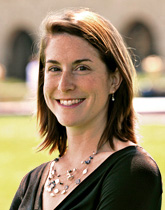Shanna Tellerman is beginning to think she'd like to settle down in Silicon Valley. She could carve out an exciting job at a huge, recognized software developer: Electronic Arts. She's already working on the development of Sims 2, EA's sequel to one of the all-time best-selling PC games. Why wouldn't she stay? She could even keep pursuing her master's degree in entertainment technology at the Carnegie Mellon Silicon Valley campus while working at EA.

But, suddenly, Tellerman has another thought. Literally. Sitting up in bed, she worries, "What if I become a cog in the machine, get bogged down in meetings, never work on my ideas?" Hours later, she tells her mentor at EA that she's returning full-time in the fall to Carnegie Mellon's Pittsburgh campus, where she had already earned her bachelor's degree in fine arts as an art major in the College of Fine Arts.
Besides her fear of falling into a rut, she has something in particular drawing her back to Pittsburgh. It's Hazmat Hotzone, a project she had been working on diligently for more than a year. Following 9-11, many emergency responders realized they needed a way to train for extreme, large-scale terrorism attacks. Developing software video scenarios for these emergency responders became Tellerman's self-directed assignment. "She stayed on the project for three semesters," recalls her Entertainment Technology Center (ETC) advisor, Jesse Schell. "In the entire life of the ETC, I'm trying to think if any student has ever done that; I can't recall any other student doing it," says the ETC associate professor.
Tellerman eventually takes Hazmat Hotzone to Wired magazine's annual NextFest event, where she stands alongside displays such as a robotic lobster designed to disarm underwater mines, and clothing that changes colors to match the wearer's mood. The reactions, though, to Hazmat Hotzone catch Tellerman off guard. Teachers, students, and others at the show tell her the different ways they could use her software—perhaps to build a program to teach geometry, or train to inspect disc brakes, or create a lifelike video game for friends or X-box players worldwide.

Tellerman returns to Carnegie Mellon and immediately shares with Schell the enticing feedback. She now envisions a transformation in Hazmat Hotzone: "Let's create this really open, free, end-to-end solution," she says. She wants a tool that any developer could use to create a simulation or a game.
Not long after earning her master's in entertainment technology in 2005, which was little more than a year after leaving EA, Tellerman co-founds Sim Ops Studios with Schell. Within the Carnegie Mellon spin-off, Tellerman and the studio team create an innovative new technology they call Wild Pockets—where users, even those using low-end laptops, can build any 3D Web-based games or simulations that they can imagine.
The concept makes sense to more than just Tellerman and Schell. Last year, despite the world's ailing economy, the startup closed a $3 million round of funding. In addition, Tellerman was among three finalists in BusinessWeek magazine's Best Young Entrepreneurs. Version 1.5 of the Wild Pockets engine was released last fall.
—Michelle Bova (HS'07)



